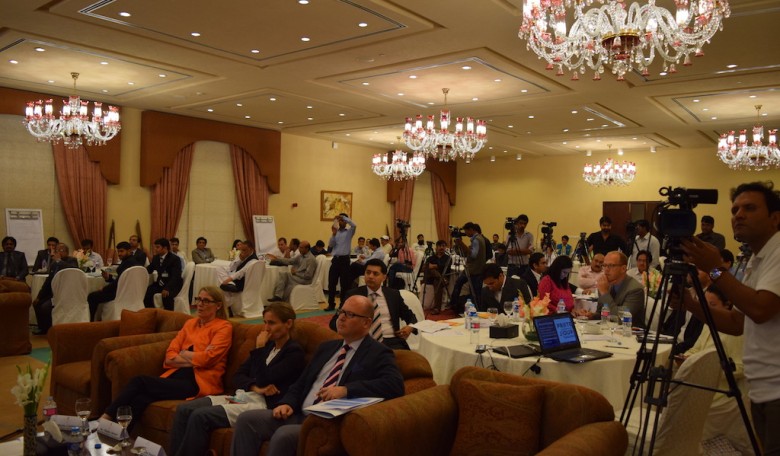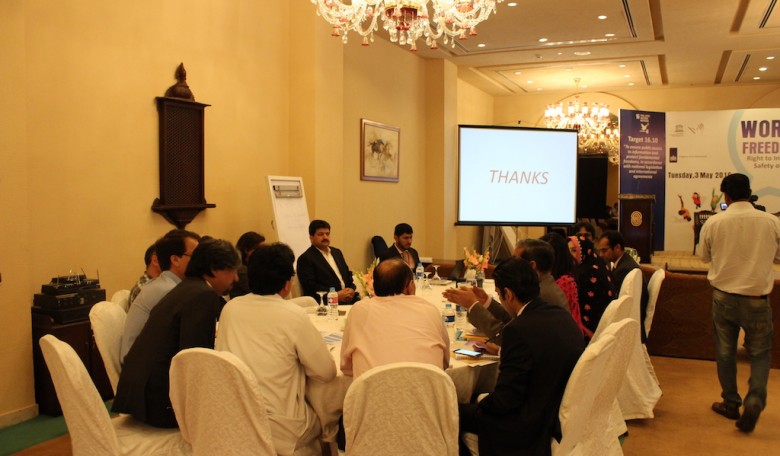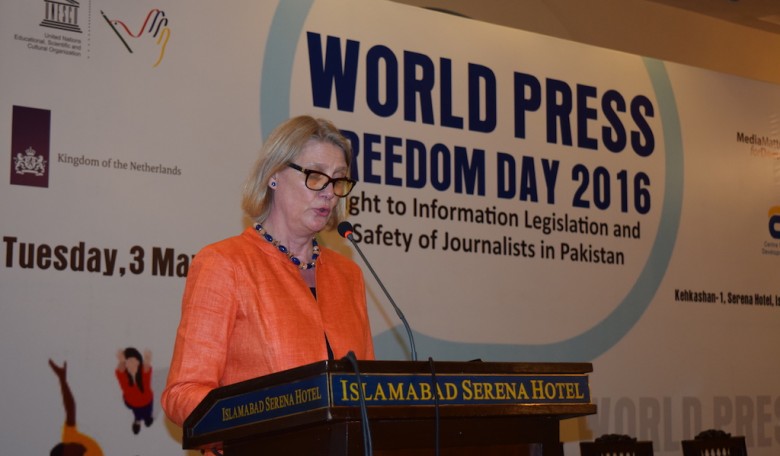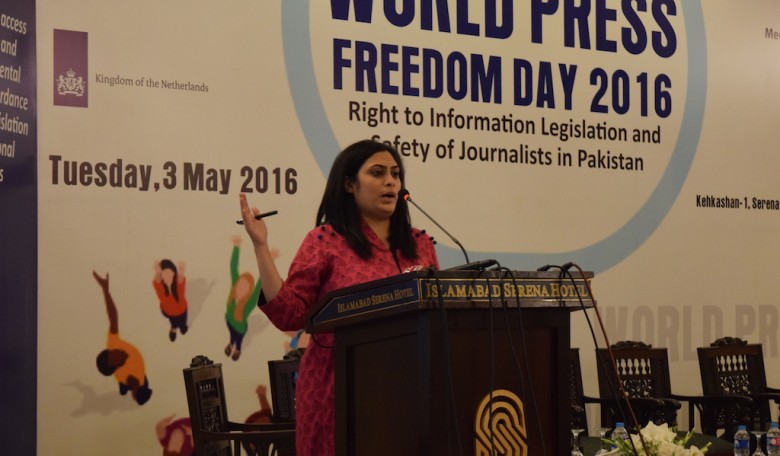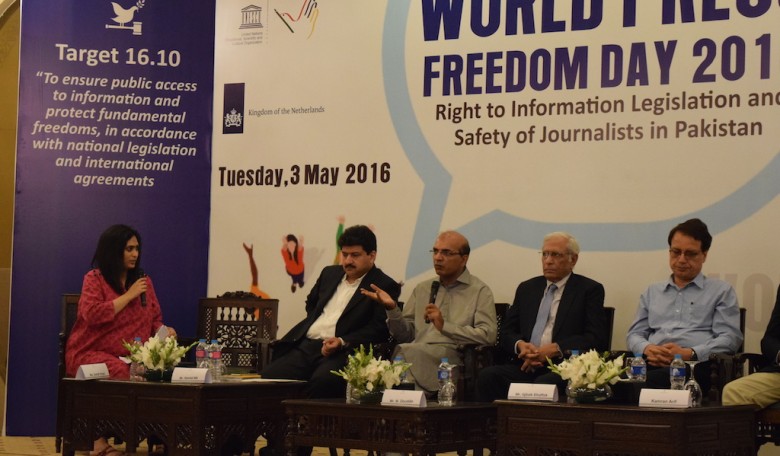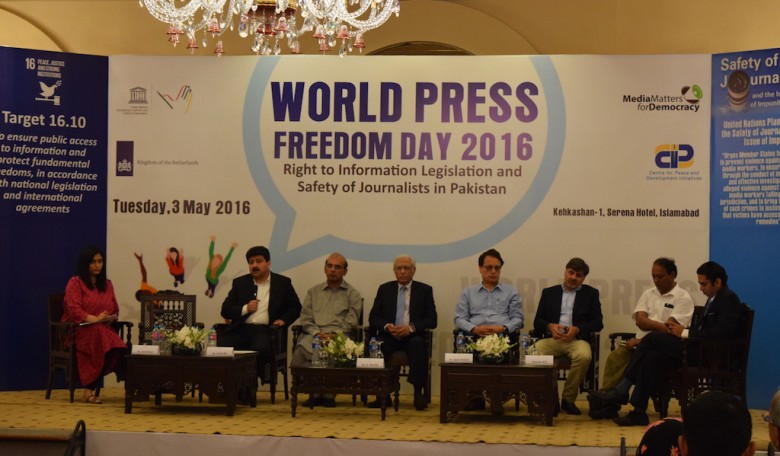Executive summary
Every 3rd May, UNESCO and the UN commemorates the World Press Freedom Day with the aim to advance the fundamental principles of press freedom and pay tribute to journalists who have lost their lives in the exercise of their profession. This year, the World Press Freedom Day coincides with three important milestones:
- The 250th anniversary of the world’s first freedom of information law, covering both modern-day Sweden and Finland
- The 25th anniversary of the adoption of the Windhoek Declaration on press freedom principles
- 2016 is also the first year of the implementation of the new Sustainable Development Agenda 2030, (SDGs).
This year’s event in Pakistan focused on two burning issues related to Press Freedom. First, the Right to Information Legislation (RTI) in Pakistan, in particular, the lessons learned from KPK and Punjab, and second Safety of journalists, in particular, an analysis of the role of media houses in advancing the safety of journalists’ agenda and Journalists Protection and Welfare Bill possible adoption.
The event titled “Right to Information Legislation and Safety of Journalists in Pakistan” was organized by United Nations Educational, Scientific and Culture Organization (UNESCO) to Pakistan with the Embassy of the Kingdom of the Netherlands, Media Matters for Democracy (MMfD) and Centre for Peace and Development Initiatives (CPDI). A Technical support was also offered by Foundation Open Society Institute-Pakistan and United Nations Information Centre Islamabad.
Following two morning workshops focused on seeking recommendations and attended by 30 participants, an official opening was held by UNESCO representative to Pakistan, Ms. Vibeke Jensen; Ambassador of the Embassy of the Kingdom of the Netherlands to Pakistan, Ms. Jeannette Seppen and Parliamentary Secretary for the Information, Broadcasting Secretary and National Heritage Ministry, Mr. Mohsin Shah Nawaz Ranjah.
As the formal opening was held in the afternoon with the presence of 113 participants, including representatives of the embassies, civil society, United Nations sister agencies and media, a panel discussion compromising senior journalists took place after the opening to highlight the main issues facing Access to Information and Safety of Journalists in Pakistan.
Workshop I: Right to Information Legislation in Pakistan
Senior journalists, lawyers, governmental representatives from the Ministry of Information, Broadcasting and Cultural Heritage and civil society experts in the fields (Detailed list hereinbelow) discussed the actual status of the Federal Right to Information bill and the lessons learned from Punjab and Khyber Pakhtunkhwa Right to Information laws. The working group also discussed the importance of promulgating a Right to Information law at the Federal level and other provinces in Pakistan: Sindh and Baluchistan.
List of participants:
- Mr. Mukhtar Ahmad Ali, Information Commissioner Right to Information Punjab
- Mr. Abdul Matin, Information Commissioner Right to Information Khyber Pakhtunkhwa
- Mr. Shahid Ur Rehman, Pakistan Federal Union of Journalists (PFUJ)
- Mr. Azaz Sayed, Journalist at GEO TV
- Mr. Muhammad Anwar, Executive Director of Centre for Peace and Justice Pakistan
- Mr. Aftab Alam, Lawyer
- Mr. Zafar Iqbal, Chairman Department of Media and Communication Studies, Islamic International University
- Mr. Nasir Jamal, Director at the Ministry of Information, Broadcasting and Cultural Heritage
The discussion facilitated by Mr. Zahid Abdullah from Centre for Peace and Development Initiative and Ms. Natalia Tariq from Foundation Open Society Institute-Pakistan led to the following recommendations :
- For the Federal Right to Information Draft Bill :
- Effective RTI legislation at the Federal level should be enacted ;
- The process of the Federal legislation on Right to Information should be made consultative, transparent and participatory ;
- Measures should be included within the new Right to Information laws to ensure the enforcement of these laws on private/ public bodies substantially funded by public money ;
- Terms and conditions of recruiting staff for the Information Commissions should be included in the RTI legislation ;
- Government departments should provide information that responds to people’s needs ;
- Stature of an Information Commissioner should be equivalent to that of Election Commissioner as in the case of India ;
- In order to develop Right to Information laws that are relevant to the Pakistani context, The Ministry of Information, Broadcasting and Cultural Heritage should involve practitioners in the deliberative process.
- For the existing Right to Information Bills in Punjab and Khyber Pakhtunkhwa:
- The Khyber Pakhtunkhwa (KPK) law should be extended to Provincial Administrative Tribal Area (PATA) ;
- Appeal against the decisions of the Khyber Pakhtunkhwa Information Commission should be heard by the Divisional bench of Khyber Pakhtunkhwa High Court ;
- Official Secrets Act and other rules, regulations, procedures and executive orders that are in conflict with RTI laws should be amended to make them consistent with the spirit of RTI legislation ;
- Requesters of information should not be required to provide copy of CNIC unless there are exceptional circumstances ;
- Government should support and strengthen the Information Commissions through timely budget and staff allocations ;
- Information Commissions should be authorized to re-appropriate funds according to their needs ;
- Khyber Pakhtunkhwa Information Commission should look into the pros and cons of awarding fine money to requestors as compensation ;
- Information Commissions should be authorized to re-appropriate funds according to their needs ;
- For the purpose of continuity in the functioning of the Information Commission, RTI legislation should ensure the appointment of Information Commissioners once the tenure of the previous Information Commissioners is complete ;
- Information should be proactively disclosed by government departments as necessitated under section 4 and 5 of the Punjab and KP RTI laws.
- For Sindh and Balochistan provinces :
- Effective RTI legislation in Sindh and Balochistan provinces should be enacted
Workshop II: Safety of Journalists Online and Offline
As for this workshop, senior journalists, lawyers, governmental representatives from the Ministry of Information, Broadcasting and Cultural Heritage and civil society experts in the field (Detailed list hereinbelow) discussed the Journalists Protection and Welfare Draft Bill. The working group highlighted two main issues, first the Protection and Welfare draft bill should not merge the security, protection and welfare parts but rather create a Journalist and Media Workers Safety Bill; second, a centralized authority is needed to bring investigation and support to the provinces in prosecution. At the end of the discussion, it was proposed to establish a commission which could be called “National Commission for Safety of Journalists.”
List of participants:
- Mr. Jabbar Khattak, Secretary General at Council of Pakistan Newspaper Editors, CPNE
- Mr. Hamid Mir, Senior Journalist at GEO TV
- Mr. Owais Tohid, Senior Journalist
- Mr. Iqbal Khattak, Coordinator on Journalists Safety at International Media Support
- Ms. Nighat Amir, Director at the Ministry of Information, Broadcasting, and Cultural Heritage
- Mr. Nadeem Kiyani, Press Information Department
- Mr. Kashis Ur Rehman, Senior Draftsmen, Ministry of Law and Justice
- Mr. Ihsan Dawwar, Journalist from the Federally Administered Tribal Areas
- Mr. Haroon Rashid, Senior Journalist and Executive Director at Freedom Network
- Mr. Kamran Arif, Co-chair at Human Rights Commission Pakistan
The discussion facilitated by Ms. Sadaf Khan from Media Matters for Democracy and Mr. Yasser Hamdani an independent lawyer led to the following recommendations:
- For the Journalists Protection and Welfare Draft Bill:
- Create a specific Journalist and Media Workers Safety Bill ;
- The centralized authority should bring investigation and support to the provinces in prosecution ;
- Adopt UNESCO’s definition of journalists and ensure that all journalists including the ones from Federally Administered Tribal Areas ( FATA) are represented in this bill, thus these latter will not remain outside the jurisdiction of laws passed by the National Assembly ;
- Threats should be defined to include threats through any medium including digital mediums and from all actors including state and non-state actors
- Female journalists should be given a specific protection in this bill with specific attention to sexual harassment that is recently used for intimidation. Thus, a separate article or clause dealing with threats to female journalists has to be added
- The legislation should include the State relocation of journalists under severe threats; the relocation verification should be dealt with through the Commission formed under this Bill, in consultation with PFUJ and other bodies like CPNE.
- The legislation should ensure the protection of journalists according to international standards and include the provision of life insurance and safety equipment especially for those working in conflict zones.
- The legislation should define a mechanism to deal with the abuse of power by any authorities. The working group did not reach an agreement regarding the exact process of ensuring such protection or mechanism and thus it requires further deliberations.
- For an establishment of a National Commission on Safety of Journalists within the future law :
- Could include multiple stakeholders: Government representatives such as a Chairman of National Assembly standing committee on information and broadcasting, Human Rights defenders selected in consultation with PFUJ and members of judiciary
- Could engage special prosecutors at different levels to prosecute the cases involving security incidents related to journalists and media workers
- Could expedite, monitor and maintain an oversight of the investigations being carried out to in cases of attacks and threats to journalists – it may have a team of special investigators who could work with the local law enforcement to strengthen the investigations
- For complementary actions to be taken:
- Advocacy activities will be needed to ensure that the Federal legislation will be replicated in other provinces
Panel Discussion
Senior journalists and experts on Right to information law raised the main issues that Journalists and Media workers are facing today in Pakistan. Mr. Hamid Mir, the Senior Journalist, alerted about the danger of impunity and highlighted a large number of killed journalists since 2000 in Pakistan, estimated at 115. According to Mr. Mir, the national interest should not be discordant with the public interest and the protection of the public interest is a duty of each journalist. He also stressed the alarming media index given by Reporters Without Borders indicating that media censorship is increasing in Pakistan.
Mr. Muhammed Ziauddin, the Senior Journalist, agreed with Mr. Mir’s opinion and underlined the problem of self-censorship widely practiced by the journalists. He highlighted the critical situation of the journalists in Balochistan, Federally Administered Tribal Areas and Karachi where journalists are attacked by different actors including extremist groups. He considered that the main role of the journalist is to watchdog but since the situation is such the role is hard to be accomplished. The media industry, according to him, is also facing some internal difficulties which makes it very hard for someone to work in this field these days.
Mr. Mukhtar Ahmad Ali, Information Commissioner on Right to Information from Punjab, explained that it is hard to change the culture of secrecy, media sector is the most affected by this matter but this culture should be changed. However, Pakistan succeeded in including the article 19- A in the constitution and Punjab and Khyber Pakhtunkhwa Right to Information Laws are among the best in the world. In Punjab for example, more than 2000 complaints were registered and around 1500 were resolved, the Commission disclosed various information of the high-level authorities, and however redundancies in the laws should be removed.
Mr. Zahid Abdullah, Program Manager at Centre for Peace and Development Initiatives expressed his concern that the Government appears to be on the verge of making amendments in a draft of Federal Right to Information Bill, that has been rated very highly by experts, under the pretext of security concerns. Mr. Abdullah was of the opinion that the draft should be tabled in its current form, without amendments, as it already offers ample cover to protect any information that might result in a security concern.
Mr. Yasser Hamdani, an independent lawyer, when asked about the possible challenges while drafting the Journalists Safety Bill, explained that the most difficult part would be to ensure a balance between freedom of expression and journalist security. Any legislation related to the media has the potential to have an impact on media freedoms so, this bill would have to be drafted very carefully and ensure that there are no mechanisms that would create the space for undue state intervention.
Mr. Kamran Arif, Co-Chair at Human Rights Commission Pakistan also explained that despite the tense security situation in Pakistan, a state of emergency has not been declared and Pakistan still has to abide by its international obligations. Thus any legislation or policies that compromise fundamental rights, including the right to information and freedom of expression are not constitutional and have no legal cover.

